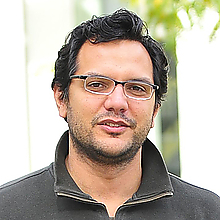Corrada Bravo Receives $1.8M Grant to Improve Genomic Data Analysis Tools

A University of Maryland genomics expert has been awarded a $1.8 million grant from the National Institutes of Health (NIH) to expand the functionality of open source data visualization software that can help identify genomic markers for cancer and other diseases.
Héctor Corrada Bravo, an assistant professor of computer science with appointments in UMIACS and the Center for Bioinformatics and Computational Biology, is principal investigator (PI) of the four-year grant.
Corrada Bravo and others will augment Bioconductor, a state-of-the-art software project that can provide a better analysis and comprehension of high-throughput genomic data.
“The Bioconductor project is a lead player in the development of statistical and computational analysis tools for high-throughput genomics data,” he says. “This grant will help us make a significant contribution to this large, collaborative project, while also furthering work in statistical and visual analysis methods underway at the University of Maryland.”
The researchers have already prototyped integrative visualization tools that are tightly coupled with the Bioconductor platform, Corrada Bravo says. This includes Epiviz, an interactive web-based application for functional data analysis.
“These are the types of tools that can aid in interpreting large amounts of complex biological data,” says Veerasamy “Ravi” Ravichandran, Ph.D., of NIH’s National Institute of General Medical Sciences, who will manage the grant. “Computational biologists like Héctor Corrada Bravo can facilitate progress by making these tools more powerful, intuitive and interactive.”
Corrada Bravo is joined on the project by associate professors Mihai Pop (computer science and CBCB) and Niklas Elmqvist (College of Information Studies)—both with appointments in UMIACS—and Martin Morgan of the Roswell Park Cancer Institute and PI of the Bioconductor project.
Elmqvist says he will work on the human-interaction and visualization components of the project.
“Users need their data to be appropriately summarized to make analysis possible, but even if we could show all of the details at the same time, it would be overwhelming,” Elmqvist says. “Instead, my work will be on ways to summarize the data, as well as allow the scientists to navigate the data while avoiding information overload.”
To see a video overview of Corrada Bravo’s research on genomics and healthcare, go here.
—Story by Melissa Brachfeld
